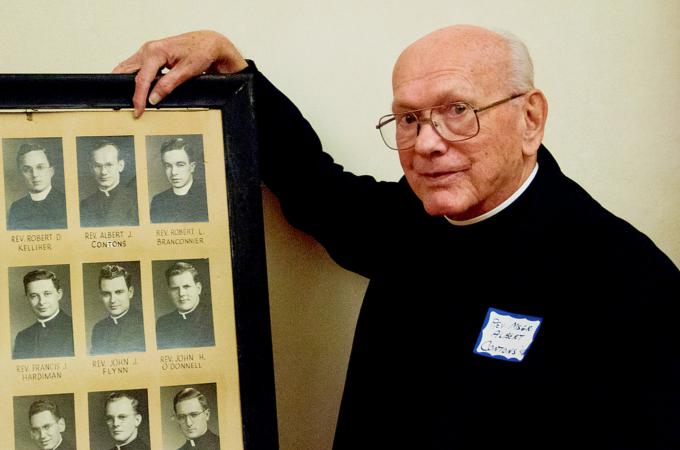Reflections of a senior priest -- Msgr. Albert J. Contons
My vocation to the priesthood was nurtured by my parents, immigrants from Lithuania, and encouraged by the exemplary priests and nuns at St. Peter Lithuanian Parish in South Boston. In the sixth grade, I told my parents that I wanted to be a doctor so I could help people. However, during my sophomore year at Boston Latin School, I read a biography of a Jesuit priest named Father Finn and was extremely impressed by his life. I decided then that the life of a priest, centered on helping to care for souls -- the innermost spiritual core of a person -- was even more important than caring for the body.
Ordained a priest, I served in my home parish of St. Peter's for five years as a curate. I then spent 20 years teaching at St. Sebastian's School, six years serving at St. Margaret Parish in Beverly Farms, and finally 20 years serving as pastor back at St. Peter Lithuanian Parish. I enjoyed sharing the joy of families at weddings, baptisms, confirmations, and other great events of family life, bringing the sacraments to the sick, attending to the dying, and working with youth in their sports and socials.
But in Lithuania, the landscape was quite different. Soviet communist armies occupied the country in 1940, and after three years of occupation by Hitler's Nazi German armies, the country was conquered by returning Soviet armies in 1944. Fearing deportation to Siberian slave labor camps and impending death, hundreds of thousands fled to German refugee camps. In 1949, several hundred families came to America and found a new home in our parish in South Boston.
The people told me not only of the atrocities of Nazi death camps, but also of the horrifying depravity of Stalin's Soviet communist regime. Russian writer Aleksandr Solzhenitsyn, himself a victim, described the cruelty of this godless way of life in his writings. Forced into exile by Soviet rulers, his departing message to the Russian people was "Live not by lies." The godless Soviet State attempted to build a new kind of "Soviet Person," totally subservient to the state. The lying propaganda of state ideology was to be accepted as the truth. This is contradicted by the "Christian Person," created in the image and likeness of God, who is love, truth, and goodness.
Life in Christ is based on the revelation of God and the best of human wisdom, the solid rock foundation of our spiritual life, and the way to find the fullness of happiness. Today, we are challenged to sift through propaganda and slogans to distinguish true prophets, rooted in reality, from the many false prophets trying to seduce us with self-made ideologies. This is the relevance of our Catholic faith.
- Msgr. Contons is a senior priest of the Archdiocese of Boston.



















